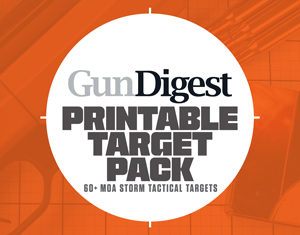If you’re ever involved in a self-defense shooting, your training courses can become relevant in court. Here’s why it’s a good idea to keep a training resume.
Recently, I took a seven-day precision rifle course, where we shot camouflaged steel targets out to 1,000 yards. That course will now be another line item on my shooting resume. I mention this because, as president of the Armed Citizen’s Legal Defense Network, I get questions all the time from members regarding how particular firearms training courses they’ve either attended or contemplated attending would look in court.
The short answer is that it shouldn’t matter.
The Considerations of a Criminal Court
First off, there are two courts to worry about: criminal and civil. Let’s first discuss criminal court, and for simplicity’s sake, I’ll use my precision rifle course as an example.
For the fact that I took this class to make it into court, it’d have to have some bearing on whether it’d make any difference as to my guilt or innocence. If I was accused of shooting someone at 500 yards (an assassination), then obviously it’d be relevant to show that I possessed the skills to make that shot.
Even more, this fact could be used to show that I took the course to prepare for this act of murder. On the flip side, if my act of homicide was performed with my daily concealed-carry gun at a range of 5 yards, then the fact of my participation in the rifle class should be non-admissible due to that fact not being relevant.
Federal Rule of Evidence 401 states: “Evidence is relevant if: (a) it has any tendency to make a fact more or less probable than it would be without the evidence; and (b) the fact is of consequence in determining the action.”
Any decent defense attorney should be able to win a “motion in limine” (a request for the court to disallow that evidence) due to it’s not being relevant.
The greater question, though is this: How would the prosecutor ever know a person took a precision rifle course? Did you discuss the event on social media? Did you supply the prosecutor with a list of courses you’ve taken in an effort to convince them you’re a well-trained good guy? (I’d recommend not doing this; it seldom does any good and oftentimes does harm.)
Your training resume should only be used to educate your defense attorney as to the extent of your training. If you and your defense attorney want to bring into the trial the fact you took a particular training course, then the certificate of training should be used as proof of attendance, along with a copy of the course material and your notes.
The other time it might be found out by the prosecution is if you’re a firearms instructor, and as an inducement for people to come train with you, you post your training resume online. One of the first things detectives do when they get a new case is to search the internet for the defendant’s name and anything that might be used against him or her.
The Considerations of a Civil Court
A civil action against you is a different situation. In a civil case, each side has the right to “discovery,” where a plaintiff’s attorney could subpoena all your training records and, only after reviewing the records, they decide what’s relevant or not. Of course, your side would try to limit the introduction of the precision rifle course, and it’d be up to the judge to decide if it comes in or not.
So, it could come up in court, and because the defendant in a use-of-force case most likely will need to take the stand to explain to the jury why you had a reasonable belief your life or the life of another innocent was in danger, you might be questioned as to why you took a particular class. And despite what I’ve written here, expect the question to come up, especially in a civil trial. You’d better have a good answer.
You’ve Got Your Reasons
This brings me to the last issue: What could possibly justify me taking a training course where I learned to shoot man-sized targets out to 1,000 yards? For me, there are three possible answers. First, I’m a firearms instructor and teach military personnel, law enforcement personnel and private citizens how to use their rifles accurately. To be able to teach, I need to also be able to perform.
The second reason is I’m considered an expert in the courts on ballistics, and one of the aspects of ballistics is external ballistics. I’ve testified several times about external ballistics. And although I’ve never testified about long-range ballistics, if asked, I feel capable of that too, having both theoretical knowledge and now experiential knowledge.
Lastly, being a hunter, I occasionally must make a decision as to whether a shot on game is ethical. I have a much better appreciation of my own skills now and am much less likely to take an unethical shot. For me, that alone is enough to justify the training.
Editor’s Note: This article originally appeared in the 2022 Made In The USA special issue of Gun Digest the Magazine.
More Knowledge For The Armed Citizen:

Next Step: Get your FREE Printable Target Pack
Enhance your shooting precision with our 62 MOA Targets, perfect for rifles and handguns. Crafted in collaboration with Storm Tactical for accuracy and versatility.
Subscribe to the Gun Digest email newsletter and get your downloadable target pack sent straight to your inbox. Stay updated with the latest firearms info in the industry.
Read the full article here



